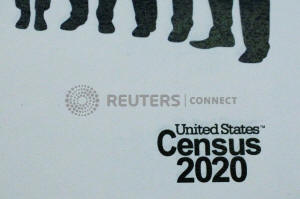|
Companies warn Trump: Census citizenship
question could be costly
 Send a link to a friend
Send a link to a friend
 [April 17, 2019]
By Lauren Tara LaCapra [April 17, 2019]
By Lauren Tara LaCapra
NEW YORK (Reuters) - An array of U.S.
companies have told the Trump administration that a citizenship question
on the 2020 Census would harm business if it leads to an undercount of
immigrants, undermining the data they use to place stores, plan
inventory and plot ad campaigns.
Corporate executives, lobbyists and representatives from major industry
groups like the Chamber of Commerce, the National Retail Federation and
the International Council of Shopping Centers have raised the issue in
meetings with government officials, according to more than a dozen
sources familiar with the matter. Some meetings date back to 2017, when
the administration was first mulling adding the question.
Industry officials continue to seek assurances from the Census Bureau
and the Commerce Department that the question's impact on the quality of
Census data will be minimized, according to the sources, who described
the meetings on condition of anonymity.
The pressure reflects the economic importance of the decennial count of
America's inhabitants.

The Census is used to draw voting districts and divide some $800 billion
in federal programs. For companies, it provides the most detailed
picture available of consumer and labor markets. Under the
administration's proposal, the Census would ask whether respondents are
citizens of the United States for the first time in 70 years.
Corporate America finds itself in an unlikely alliance with immigrant
advocacy groups that have sued to block the question on the basis it
could scare immigrants out of participating, and therefore cost their
communities funds and political representation. The Supreme Court plans
to hear arguments on the case next week.
Clothes-maker Levi Strauss & Co , transport companies Uber Technologies
Inc and Lyft Inc and media group Univision Communications Inc are among
a handful of companies supporting that lawsuit. In court documents, they
said the citizenship question "threatens to undermine (the) reliability
of Census data and therefore substantially reduce its value to
businesses."
Few other companies or trade groups, however, have been willing to
discuss their opposition to the citizenship question publicly. In
interviews, sources said they are only voicing opinions in private
meetings, out of concern about a White House backlash.
Spokespeople for several major trade groups along with big name
companies like Walmart Inc, Alphabet Inc's Google, Amazon.com Inc and
many others either declined to offer a statement for this story or did
not respond to requests for comment.

"While corporations and business groups are reluctant to enter the
political turmoil surrounding the citizenship question on the 2020
Census, they nonetheless depend heavily on accurate Census data for
their operations," said DeVere Kutscher, executive director of the
Census Business Coalition, one of the main groups advocating on behalf
of industry.
"As a result, they are focusing their efforts on what they can do to
support a complete, secure, and accurate count, and are understandably
concerned about the impact of any factor which could jeopardize that,"
he added.
Underscoring the political stakes, earlier this month President Donald
Trump ripped "radical" Democrats opposed to the citizenship question on
Twitter, saying a Census without such a question would be "meaningless."
The Census Bureau has taken pains to ensure everyone is counted, Burton
Reist, a longtime Census official who oversees decennial communications
and stakeholder relations, said in an interview. In response to
questions about the business community's view on the citizenship
question, a spokesman pointed Reuters to the Census Bureau's official
responses to stakeholders.
[to top of second column]
|

An informational pamphlet is displayed at an event for community
activists and local government leaders to mark the one-year-out
launch of the 2020 Census efforts in Boston, Massachusetts, U.S.,
April 1, 2019. REUTERS/Brian Snyder

The Commerce Department, which houses the Census Bureau, declined to
comment.
Documents released through litigation confirm that Commerce
Secretary Wilbur Ross met with dozens of interested parties,
including business groups, to get their views before announcing his
decision to add the citizenship question last year.
While many expressed concerns that the question would hurt response
rates, Ross was not convinced, according to a March 2018 memo he
wrote explaining his decision. He said data from the question would
help the Department of Justice enforce provisions of the Voting
Rights Act.
AN "MRI" FOR BUSINESS
The stakes are high in getting an accurate count.
Retailers like Walmart and Target Corp use Census data to decide
where to open stores or distribution hubs, and what to stock on
shelves.
Big banks like JPMorgan Chase & Co use the information similarly for
branch strategy, and real-estate firms scrutinize the statistics to
determine where to build homes and shopping centers.
TV networks like Univision, meanwhile, rely on the numbers to plan
programing in local markets. And the Census is an important input
for tech giants like Google when they create myriad data-based
products, such as maps.

"You get households, number of people, number of bedrooms, income,
gender, age, race, marital status — it's almost like an MRI," said
Jack Kleinhenz, chief economist for the National Retail Federation.
"And it all goes into assessing where and how to provide goods and
services."
Underscoring how the survey can drive major business decisions,
Amazon's 20-city search for a new headquarters location also had
Census data at its core.
Having failed to convince the administration to drop the question,
companies are now focused on programs to encourage people to
participate in the Census to bolster data quality, sources said.
Efforts could include company-wide email messages to employees,
prominently displaying a link to the Census on corporate web sites
or setting up physical stations where customers can fill out the
survey inside of stores or malls, the sources said.
Ahead of the 2010 Census, McDonald's Corp featured information on
restaurant placemats, Walmart greeters handed out flyers, big
retailers featured reminders on receipts and utility companies stuck
inserts into electric, gas and water bills.
Such programs have been helpful in the past, said John Thompson, who
spent nearly 30 years at the Census Bureau before leaving as
director in 2017. But whether they can overcome the negative impact
of the citizenship question is an open question.
"They've got a tougher row to hoe," he said.

(Reporting by Lauren Tara LaCapra in New York; Additional reporting
by Nandita Bose in Washington; Kenneth Li, Herb Lash and Caroline
Humer in New York; and Katie Paul and Jeffrey Dastin in San
Francisco; Editing by Richard Valdmanis and Paul Thomasch)
[© 2019 Thomson Reuters. All rights
reserved.]
Copyright 2019 Reuters. All rights reserved. This material may not be published,
broadcast, rewritten or redistributed.
Thompson Reuters is solely responsible for this content. |